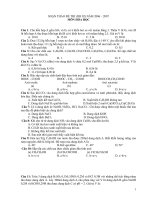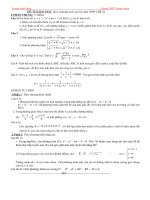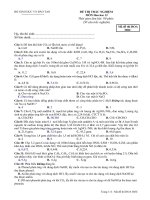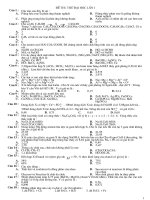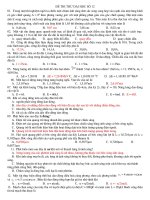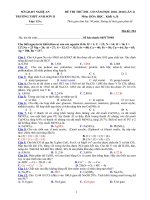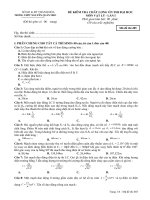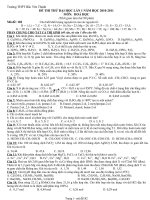Đề thi thử ĐH có Đáp Án(2010-2011)
Bạn đang xem bản rút gọn của tài liệu. Xem và tải ngay bản đầy đủ của tài liệu tại đây (97.54 KB, 6 trang )
DE THI THU DH (2010-2011)
A. PHONETICS
1. Choose the word with the different pronunciation of the underlined part.
1. A. noon B. tool C. flood D. moon
2. A. summer B. future C. number D. drummer
3. A. three B. thanks C. think D. father
4. A. ear B. pear C. fear D. hear
5. A. switch B. chorus C. match D. catch
2. Choose the word with the different stress pattern.
6. A. piano B. policeman C. museum D. souvenir
7. A. typist B. address C. assistant D. accountant
8. A. digit B. director C. display D. dramatic
9. A. contaminate B. supervisor C. investigate D. convenient
10. A. comfortable B. justify C. judgement D. accompany
B. VOCABULARY
I. Choose the best answer.
11. Nobody knows what the of the explosion was.
A. source B. reaction C. cause D. reason
12. It Magellan over a year to sail around the world.
A. took B. lasted C. cost D. spent
13. You get a lovely of the park from the bedroom window.
A. look B. scene C. sight D. view
14. Unfortunately, his illness turned out to be extremely so he was kept in isolation.
A. influential B. infectious C. individual D. inoffensive
15. Mathematics is a subject in school.
A. easy B. choice C. unimportant D. compulsory
16. They didn't have enough in their suitcases for all the things they had bought on
holidays.
A. size B. place C. room D. area
17. She had no of selling the clock. It had belonged to her grandfather.
A. intention B. meaning C. interest D. opinion
18. Be patient. Don't to learn a foreign language in a week.
A. believe B. consider C. think D. expect
19.I wanted to put my stereo together, but I couldn't make of the instructions.
A. sight B. sense C. reality D. understanding
20. The doctor told me to take the pills three times a day.
A. regularly B. customarily C. occasionally D. practically
2. Read the passage and choose the best answer.
Emma Ilarte, in Barbara Taylor Bradford's novel, was a poor lonely girl who became the
(21) owner of an international chain of stores. Like the woman she writes about, Ms
Bradford is beautiful and (22) She left school at sixteen and became a (23) After
twenty-three years of this work, she made the (24) to start writing novels. She is now one
of the most (25) paid novelists in the world.
Was Emma Ilarte's story based on Ms Bradford's own (26) successful life? "I'm afraid
not," she said with (27) "My life has been quite different from Emma Harte's. She was
(28) to be born into a poor family. I came from a middle-class home and I'm (29)
married to a rich American film producer. The only thing I share with my heroine is her
(30) to work hard."
21. A wealth B unhealthy C richness D wealthy
22. A ambition B ambitious C greed D greedy
23. A journal B report C journalist D newspaperman
24. A decide B decided C decisive D decision
25. A high B badly C highly D height
26. A incredible B incredibly C credible D credibly
27. A amusement B amuse C amused D amusing
28. A luck B lucky C unlock D unlucky
29. A happy B happiness C happily D unhappily
30. A ability B unable C able D possibility
C. GRAMMAR Choose the best answer.
31. Next week, we're going to take a
A. three day trips B. three-day-trip C. three days trip D. three days' trip
32. People how to dye their clothes even before they knew how to read and write.
A. had known B. have known C. knew D. are known
33. It's time we this old car and bought a new one.
A. will sell B. had sold C. sold D. have sold
34. Are there any household chores for men are better than women?
A whose/ suited B which/ suit C that/ suit D which/ suited
35. E-mail is an effective form of communication many businesses rely.
A on which B on that C which D that
36. I'm angry because you didn't tell me the truth. I don't like
A. deceiving B. being deceived C. having deceived D. to deceive
37. The book, is on the top shelf, tells the life story of Thomas Edison.
A. that B. where C. whose D. which
38. It is said that amber beads around the neck can you against illness.
A wear/ protecting B wearing/ protect C worn/ to protect D worn/ protect
39. No one is to hear that films and TV a bad effect on students' reading and writing
skills.
A surprised/ have B surprise/ has C surprising/ having D surprised/ has
40. Neither Mary nor her two brothers superstitious.
A is B was C are D have
41. Daisy the piano when we arrived.
A. was playing B. will play C. was played D. is playing
42. My father prefers tea coffee in the morning.
A. than B. to C. as D. instead
43. "Show me you hid the toy-gun ?" Bob asked his brother.
A. why B. when C. who D. where
44. One of the most inspiring ever known is my mathematics teacher.
A peoples I've B people I've C people I'm D people I'd
45. He encourages students rather than memorise formulas and rules.
A to think B think C thinking D think
46. I can put up with a lot of I can't tolerate dishonesty from a friend.
A thing, but B thing, and C things, but D things, and
47. If I had a chance to do creative work, I happy working in an office.
A will be B would be C would have D will feel
48. She is one of those who money.
A. enjoys to spend B. enjoys spending C. enjoy to spend D. enjoy spending
49. Nobody will approve of your that way.
A. behave B. behaviour C. behaving D. to behave
50. Language could more quickly if there were more language exchange programs.
A be learning B have learned C have learning D be learned
D. USE OF ENGLISH
Choose the underlined word or phrase in each sentence that needs correcting.
51. Acupuncture (A) comes from the traditional (B) Chinese system of medicine that (C)
including herbalism, massage, diet, (D) manipulation and exercise.
52. (A) Traditional Chinese medicine (B) see health as a state (C) in which the energy of the
mind, body and spirit (D) are in harmony.
53. An eccentric is (A) someone whose behaviour (B) is normal, someone who refuses (C) to
conform to the (D) accepted norms of his society.
54. People seldom (A) act natural in front (B) of the camera. (C) Often they stiffen up and the
pose becomes (D) rather wooden.
55. It is (A) disappointing that (B) almost tourists who (C) come to the country only visit the (D)
same few overcrowded places.
56. The (A) earliest art (B) forms may well (C) had been wood carvings or (D) body painting.
57. The (A) role of learning in human art (B) is also clear in (C) how quickly our art styles (D)
changes.
58. Someone (A) who is (B) prepared to take time and patience (C) developing the driving skill
(D) makes a good driver.
59. Good sense, (A) alert and confidence are (B) more important, but you (C) also need a
reasonable (D) memory to take the driving test.
60. Driving (A) is getting more (B) demanding all the time, so we must (C) make sure people
learn (D) efficient in the first place.
E. READING COMPREHENSION
I. Read the passage and choose the best answer.
English has had a long tradition of borrowing words from other languages. This tradition began
with the conquest of Britain by the Norman-French in 1066. Because these conquerors
established themselves as rulers, their dialect of French became the language of the aristocracy, of
government, and of education. During this period, many French words came into the English
language. Another strong influx of vocabulary came from Latin, which was the language of the
church Today, those words derived from French and Latin, though still identifiable, are not
thought of as foreign by English speakers. Tradition, language and conquest are words that come
to us from this tradition.
The British colonial era, which began in the early 17
l
century, brought English speakers into
contact with many other languages. In North America, words from the Native American peoples
quickly found their ways into the language Examples include moccasin (a kind of soft shoe),
squash (a vegetable)
The presence of Spanish colonies in North America led to the adoption of numerous Spanish
words, such as siesta (a nap) and tortilla (a flat thin pancake). Asian languages also make
contributions. For example, the word pyjamas comes from a Hindi word, khaki comes from Urdu,
and ketchup was borrowed from Chinese. Words from African languages, too, made their ways
into English when African slaves served in the United States. The result of all of this absorption
of new words is a very rich vocabulary that allows users of English to express subtlety of
meaning through their choice of words.
61. Many French words came into the English language when
A French traders did business with the British. B the Norman-French conquered
Britain.
C British people ruled France in early 17
th
century. D African slaves worked in Great
Britain.
62. Tradition, languages and conquest are examples of
A borrowed words no longer considered foreign. B words borrowed from Latin.
C words used in this passage. D words no longer popular in English.
63. Words from the Native American peoples came into English
A when Native American peoples came to Britain.B during the British colonial era
C in the 18
lh
century. D before those from Latin.
64. Words such as squash, tortilla, ketchup were all borrowed from
A other languages. B Asian languages.
C the Native American peoples. D African languages.
65. Which of the following is correct?
A More Latin words came into the English language than French ones.
B English has borrowed many words from French and Latin, although these words are no longer
foreign.
C Users of English like to express subtlety of meaning through words from French.
D Most words of clothing were borrowed from Asian languages.
II. Read the passage and choose the best answer.
This year, the school is offering new summer courses, which sound very good indeed. They are
able to offer many more conversation classes than before. And for about half of these classes the
students will be working in groups of seven or eight. Courses on reading and writing will also be
given. There's a completely new reading course, in fact, which the students will find very
interesting. Teachers will use current newspaper articles and other material. For the first time this
year, the school is running a computer course, too. The school will be also continuing the video
course, which was very popular last year. Benfield School has some new video equipment and the
teachers know a lot about video.
All this sounds like hard work! But there will be a lot of leisure activities too. The school has
arranged for students to use the sports center near the school in the afternoons and evenings, at
greatly reduced prices. And it has planned a lot of visits to places of interest. There will be some
special surprises for the students as well. The school has organized a group visit to a television
studio, as a suitable end to the video course. Some students will be able to take flying lessons at
the airport. The school only takes between forty and fifty students at a time. Although it is a small
school, only a few of the students stay at the school itself, in one of two flats in the main building.
Most of the summer students will stay with families in the town.
66. Some of the conversation classes will be held in groups of
A 3 -5. B 5. C 7-8. D 17.
67. There will be new courses in
A reading and computers. B reading and writing. C video and computers. D
video and reading.
68. Students can take part in sport at
A the school. B the sports hall. C the sports center. D the school field.
69. As a special surprise there will be
A a computer course. B a trip to a place of interest.
C a video show. D a visit to a TV studio.
70. Some students may be able to
A make video films. B give the other students a surprise.
C learn to fly a plane. D plan some special visits.
F. STRUCTURES
Choose the correct sentence which has the same meaning as the given one.
71. If you are disappointed with an inexpensive bicycle, then save your money for a more
expensive model.
A You should save up to buy a more expensive bicycle if your inexpensive one disappoints you.
B An inexpensive bicycle is disappointing, so buy an expensive one.
C A more expensive bicycle saves you much money, so don't buy an inexpensive model.
D You'd better buy an inexpensive bicycle to save more money.
72. You should take regular exercises instead of sitting in front of the television all day.
A Sitting in front of the television all day and taking exercises is advisable.
B Don't take regular exercises, just sit in front of the television all day instead.
C Sitting in front of the television all day helps you take regular exercises.
D Taking regular exercises is better than sitting in front of the television all day.
73. Who made you work so hard yesterday?
A Why did you work so hard yesterday ?B What made you work so hard yesterday?
C Who forced you to work so hard yesterday?D How could you work so hard yesterday?
74. Only with careful environmental planning can we protect the world in which we live.
A Careful environmental planning protects the world we live in.
B We can protect the world we live in only with careful environmental planning.
C Protecting the world we live in, we plan the environment carefully.
D Planning the environment carefully, we can protect the world in which we live.
75. My brother and I dressed as quickly as we could, but we missed the school bus and were
late for school today.
A My brother and I were late for school because we dressed too quickly.
B My brother and I dressed quickly but were late for school because we missed the school bus.
C My brother and I missed the school bus so we were late for school
D My brother and I could dress quickly but could not be in time for school.
76. Doing more than checking out books, the city librarian must help to plan puppet shows for
children.
A Checking out more books than puppet shows is what the city librarian must do.
B The city librarian checks out books and puppets for children in the city.
C Helping to plan puppet shows for children is the main duty of the city librarian, not checking
out books.
D The librarian must help to plan puppet shows for children in addition to checking out books.
77. Cocaine will destroy more people and the environment as it spreads to other countries.
A Cocaine spreads to other countries after destroying people and the environment.
B Spreading to other countries, cocaine will destroy more people and environment.
C Cocaine destroys more countries with people and environment.
D Cocaine will spread to countries and destroy the environment.
78. The clouds covered the moon so thickly that we couldn’t find our way back to the cottage.
A We couldn't find our way back to the cottage because the clouds covered the moon thickly.
B The clouds were too thick to find their way back to the cottage.
C The moon was covered so thickly that it couldn't find the way out.
D The way back to the cottage couldn't be found as the clouds were so thickly covered.
79. Colour is an important facet of nature, influencing the life of almost every creature.
A Influencing the life of almost every creature in nature, colour is important.
B As important as every creature in nature, colour influences every facet of nature.
C Colour, which is an important facet of nature, influences the life of almost every creature
D Colour influences the life of almost every important creature in a facet of nature.
80. She feels happy because of her coming birthday party.
A Her coming birthday party makes her happy. B Because she was born she feels
happy.
C She feels happy to come to a birthday party. D Her birthday party will happily come.
ANSWER KEYS
1C 2B 3D 4B 5B 6D 7A 8A 9B 10D
11C 12A 13D 14B 15D 16C 17A 18D 19B 20A
21D 22B 23C 24D 25C 26B 27A 28D 29C 30A
31B 32D 33B 34B 35A 36C 37A 38D 39A 40C
41D 42B 43A 44B 45A 46C 47B 48D 49C 50D
51C 52B 53B 54A 55B 56C 57D 58C 59A 60D
61B 62A 63B 64A 65B 66B 67A 68B 69C 70D
71A 72D 73C 74B 75B 76D 77B 78A 79C 80A
